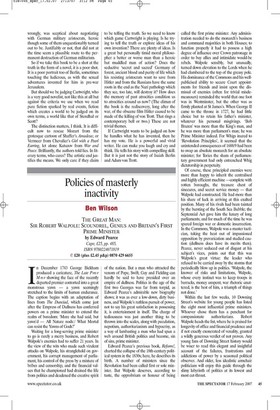Policies of masterly inactivity
Ben Wilson THE GREAT MAN: SIR ROBERT WALPOLE: SCOUNDREL, GENIUS AND BRITAIN'S FIRST PRIME MINISTER by Edward Pearce Cape, £25, pp. 485, ISBN 9780224071819 © £20 (plus £2.45 p&p) 0870 429 6655 1 n December 1743 George Bickham produced a caricature, The Late P-m-r M-n-r showing the face of the recently departed premier contorted into a great monstrous yawn — a yawn seemingly stretched to the limits of human endurance. The caption begins with an adaptation of lines from The Dunciad, which come just after the Empress of Dullness has conferred powers on a prime minister to extend the realm of boredom: 'More she had said, but yawn'd — All Nature nods:! What Mortal can resist the Yawns of Gods?'
Waiting for a long-serving prime minister to go is rarely a merry business, and Robert Walpole's enemies had to suffer 21 years. In the view of the wits who made such virulent attacks on Walpole, his stranglehold on government, his corrupt management of parliament, his control of the press by a mixture of bribes and censorship, and the financial values that he championed had drained the life from politics and deadened the creative spirit of the nation. But a man who attracted the venom of Pope, Swift, Gay and Fielding can hardly be said to have presided over an empire of dullness. Politics in the age of the first two Georges was far from torpid, as Edward Pearce's admirable new biography shows; it was as ever a low-down, dirty business, and Walpole's ruthless pursuit of power, not to say his great satisfaction in possessing it, is entertainment in itself. The charge of tediousness was just another thing to be thrown into the scales, along with peculation, nepotism, authoritarianism and hypocrisy, as a way of lambasting a man who had spun a web around British politics and become, sin of sins, prime minister Edward Pearce's previous book, Reform!, charted the collapse of the 18th-century political system in the 1830s; here, he describes its birth. A number of ministers since the Revolution had been called first or sole minister. But Walpole deserves, according to taste, the opprobrium or honour of being called the first prime minister. Any administration needed to do the monarch's business and command majorities in both Houses; to function properly it had to possess a high degree of influence over Crown patronage in order to buy allies and intimidate would-be rebels. Walpole sensibly, but unusually, turned down elevation to the Lords when he had clambered to the top of the greasy pole. His dominance of the Commons and his wellpublicised ability to secure Court appointments for friends and insist upon the dismissal of enemies (often for trivial misdemeanours) reminded the world that one foot was in Westminster, but the other was as firmly planted at St James's. When George II came to the throne in 1727, he had little choice but to retain his father's minister, whatever his personal misgivings. 'Bob Brazen' was more than the King's man, and he was more than parliament's man; he was Prime Minister indeed. For Whigs inured to 'Revolution Principles', it seemed that the unintended consequences of 1688/9 had been to swap an absolute monarch for an absolute minister; for Tories the sham of parliamentary government had only entrenched Whig dictatorship in perpetuity.
Of course, these principled enemies were more than happy to inherit the centralised and highly efficient machine complete with rotten boroughs, the treasure chest of sinecures, and secret service money — that Walpole had constructed. He had more than his share of luck in arriving at this exalted position. Many of his rivals had been tainted by the bursting of the South Sea Bubble; the Septennial Act gave him the luxury of long parliaments; and for much of the time he was spared foreign war or domestic insurrection. In the Commons, Walpole was a master tactician, taking the heat out of impassioned opposition by prevarication and studied caution (dullness does have its merits then). Pearce, never seduced out of disgust at his subject's vices, points out that this was Walpole's great virtue: the leader who refused to be carried away by the storms that periodically blow up in politics. 'Walpole, the knower of risks and limitations, Walpole, whose every instinct was to keep troops in barracks, money unspent, war rhetoric unuttered, is the best of him, a triumph of things not done.'
Within the last few weeks, 10 Downing Street's website for young people has listed the eight most influential prime ministers. Whoever chose them has a penchant for compassionate authoritarians. Robert Walpole heads the list, where he is praised for longevity of office and financial prudence and if not exactly exonerated of venality, granted a wildly generous verdict of not proven. Any young fans of Downing Street history would be wiser to read this elegant and insightful account of the failures, frustrations and addictions of power by a seasoned political observer. And older, less idealistic armchair politicians will enjoy this guide through the slimy labyrinth of politics at its lowest and most cut-throat.

























































 Previous page
Previous page